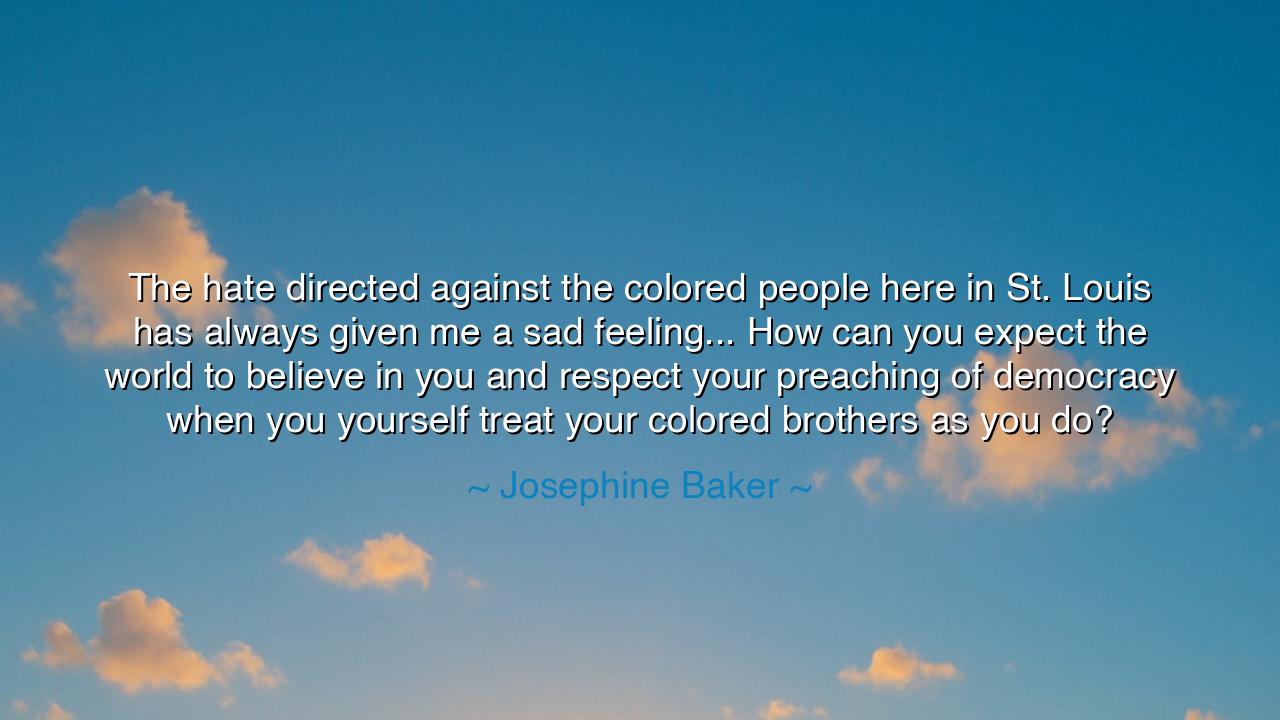
The hate directed against the colored people here in St. Louis
The hate directed against the colored people here in St. Louis has always given me a sad feeling... How can you expect the world to believe in you and respect your preaching of democracy when you yourself treat your colored brothers as you do?






Hear the words of Josephine Baker, the singer and dancer who became more than an entertainer—who became a voice of justice: “The hate directed against the colored people here in St. Louis has always given me a sad feeling… How can you expect the world to believe in you and respect your preaching of democracy when you yourself treat your colored brothers as you do?” In these words lies not only the cry of one woman, but the eternal accusation against hypocrisy—that a nation cannot claim to be a beacon of freedom while it binds its own people in chains of hatred.
Josephine Baker, born in St. Louis, had known poverty, prejudice, and the sting of racism from childhood. She carried these wounds even as she rose to international fame in Paris, where she was celebrated as an icon of beauty and talent. Yet when she returned to America, she was confronted again with the same cruelty she had fled: segregation, humiliation, and hate. It was in this contrast—being honored abroad yet despised at home—that her words were forged. The sadness she names is not only personal, but universal: the grief of seeing a land of promise betray its own ideals.
The ancients, too, spoke of such hypocrisy. The prophets of Israel thundered against their own people, saying, “You proclaim justice with your lips, but with your hands you oppress the poor.” Rome, while boasting of civilization, enslaved countless nations. Always, the pattern is the same: empires fall when their actions devour the very truths they claim to uphold. Baker’s words stand in this ancient tradition, as a warning that the American preaching of democracy could not endure if it denied freedom to its own children.
Consider also the story of Frederick Douglass, who once declared to America: “You boast of liberty, yet you hold the Negro in bondage. What to the slave is the Fourth of July?” His rebuke, like Baker’s, pierced the heart of contradiction. Both voices remind us that respect is not earned through words, but through deeds—that a nation gains honor not by preaching its ideals abroad, but by practicing them at home.
Baker’s invocation of “colored brothers” is deeply powerful. She speaks not as one separated by race, but as one joined by kinship. Her lament is not only for her people, but for the whole nation—that white and Black are brothers, bound together, and that the betrayal of one is the degradation of all. Her plea is not merely for fairness, but for unity: that America cannot command the world’s respect until it heals its own divisions.
The sadness she expresses is also prophetic. For she understood that a democracy infected by prejudice is weak before the eyes of the world. How could America stand as a light against tyranny abroad while permitting the tyranny of segregation within? Her voice, like that of many who fought for civil rights, exposed the rot beneath the surface and called for a renewal of the nation’s soul.
The lesson is clear: hypocrisy destroys both individuals and nations. If you preach justice, you must live it. If you speak of equality, you must practice it in your own home, your own community, your own land. The world sees not only your words, but your deeds. And the respect of others, whether for a person or a nation, is earned not by what is claimed, but by what is done.
Therefore, let all who hear take this counsel: root out the seeds of prejudice in your heart, your home, and your nation. Do not let your ideals be empty banners, but living truths. For the world watches, and history remembers. Josephine Baker’s words remind us that democracy without justice is only an illusion, and that the true test of freedom is how we treat our own brothers.






AAdministratorAdministrator
Welcome, honored guests. Please leave a comment, we will respond soon